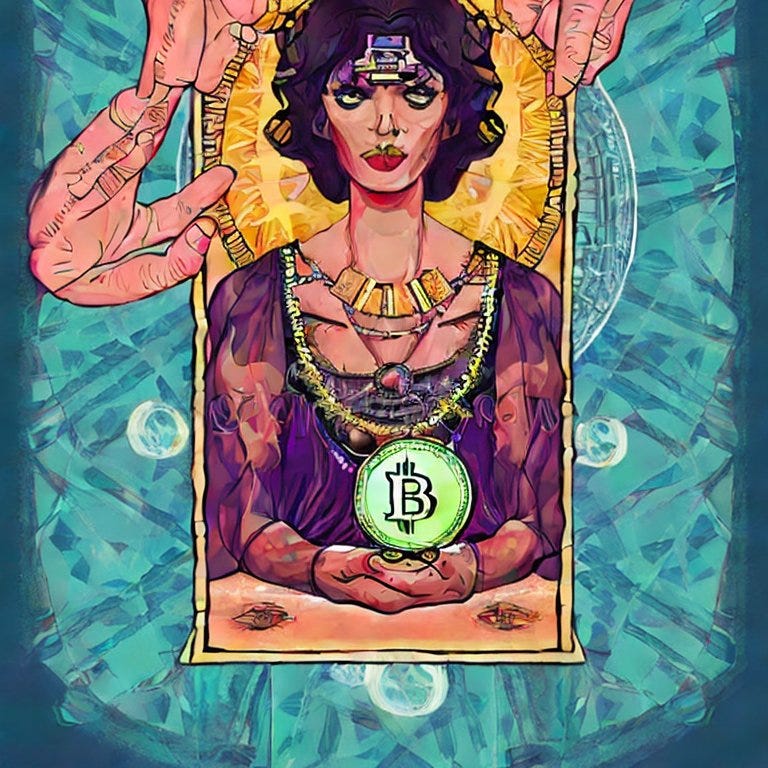Network Age Reflections: Ep. 24: " Crypto Narratives, New and Old (feat. CoinDesk Reporters Marc Hochstein and Tracy Wang)"
Some musings on a recent episode
On our most recent episode, The Network Age was visited by esteemed CoinDesk reporters Marc Hochstein and Tracy Wang to discuss last year’s most prominent crypto narratives and what to expect from 2023. Since we released our episode, Tracy has won a prestigious Polk Award for her reporting on the FTX scandal. We can only assume that the extra exposure Tracy received from appearing on The Network Age helped propel her to stardom. You’re welcome Tracy.
Besides launching Tracy’s career, this was a really fun episode because it gave me a chance to take a step back and look at crypto as a whole. Working at Uqbar, it can be easy to only focus on the bits of the industry right next to me—chatting with smart, interested people who analyze the entire space reminds me how little I (or anyone else) know about what is going to happen.
Some thoughts:
The Crypto World is Not Normal
This is something I have to remind myself. If you spend your professional life researching crypto, hanging out on crypto Twitter, going to conferences, god forbid having crypto friends, you begin to forget what the rest of the world looks like. Hint: it ain’t like this.
This is good and bad. After a long day of marking shitcoin-shilling Telegram chats as spam or reading about some schmuck who lost his wife after leveraging her jewelry to long Luna, it can be hard to feel that the crypto world isn’t out to get you. We may not be in the Wild West ICO days of 2017, but blockchain is still full of scammers, cons, and snake oil salesman ready to pick your pocket. Add that to the just plain annoying people who seem less interested in truth than profit, shutting out any meaningful discourse because that’s not where they keep their bag, it can be a disheartening space. Everyone is an evangelist, and what they’re working on is the most important thing in the world.
And yet, the crypto world is also extraordinary in a good way. These same one-track minded builders are not just shouting into the void—they are pushing the boundaries of society and technology. As Matt Liston said on episode episode 22, bring on the crack pipes. We are living on the edge of a real, meaningful change in how society arranges itself. Remember, crypto is not the most important thing in the world—it is a means to an end—a bridge to a world that is more equitable, free, and interesting. It takes whacky ass dreamers to make that happen. People like the guy who sold Marc Hochstein a bitcoin in a park while wearing sweatpants and articulated toe shoes. With those people in charge, of course not everything goes exactly according to plan.
As Tracy said, for reporters, it's good to be “long volatility.” Frankly, as just some guy typing at my computer all day, crypto’s craziness is good for me too. There are a lot of boring, easy things we could do for a living. Fuck that. Life’s short. Ride the rollercoaster. Just remember to come up for air when you need it.
No One Can Predict the Future
I listen to a lot of baseball podcasts. With pitchers and catchers reporting this week, it’s time for the annual exercise when beat reporters are forced to give win total projections for their teams. The thing is, they hate it. They try as hard as they can to avoid saying a concrete number. They squirm like they’re being tortured. Whereas I know exactly how many wins the San Francisco Giants are going to get this year (88), those with experience know the far more profound truth—we know nothing.
The same is true of crypto. Go on Twitter and every amateur crypto fan is telling you exactly what is about to happen this year. They’re posting market charts with magic Xs and infallible trend lines. Influencers are tweet threading their theses. 99% percent of the time, of course, they’ll be wrong. But rest assured when the blind tweeter hits a bullseye, they’re going to remind you of it. Just don’t forget what they say about stopped clocks.
One thing I loved, though, about talking to Marc and Tracy is that they didn’t pretend to know the answers. They had some guesses about what might come up this year (regulation, zero-knowledge, etc.), but most of all they very rightly shrugged their shoulders and said, I’m not sure, this shit is wild, but I can’t wait to see.
Listen to those that are smarter than us. Don’t try to predict the future. Grab your popcorn, sit down, and enjoy the show.
Urbit is Still VERY Niche
This is something I forget. Everyone I know professionally is a weird little Urbit freak. Even my normal IRL friends, by virtue of my ranting, have some concept of Urbit (though usually its just to say—what’s your funny-ass name on that computer thing again?). But most people don’t know about Urbit! In fact, most crypto people don’t know about Urbit. Tracy Wang, quite literally an award-winning crypto reporter and one of the most informed Web3 people in the world, did not know what Urbit is.
This is not Tracy’s fault—this is our fault. Tracy is very smart and talented. We should want people like her reporting, investigating, and writing about Urbit. It’s up to us to spread the word.
Luckily, we’ve got Marc Hochstein on our side, a talent and inspiration in his own right. But next time he comes on the show, I’m going to expect all of his coworkers to be using their sigils as pfps. Because that’s how we get this thing going–one Urbit pill at a time.




